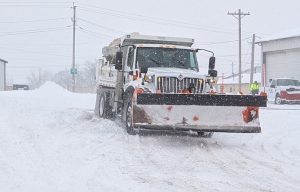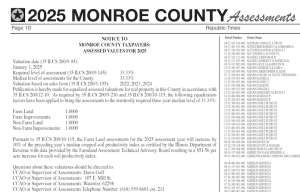Grocery tax decision looms
The state’s 1 percent grocery tax ends Jan. 1, 2026, but local governments can choose to retain it without asking residents for permission.
Governor JB Pritzker signed HB3144 into law in August 2024. With the passage of this bill, Illinois’ 1 percent grocery tax will expire statewide, but local governments can pass an ordinance to maintain this tax without voter input.
This 1 percent tax applies to grocery items intended to be consumed off-premises. It was enacted in 1990 under former Illinois Governor Jim Thompson.
Although this grocery tax was imposed statewide, the revenue collected goes exclusively to local governments. In ending this tax, Pritzker put pressure on local leaders to cut spending or continue taxing their residents with the sales tax.
Some are letting the grocery tax expire, but others are not.
In Waterloo, the grocery tax recently came up as only a discussion item at the June 2 ordinance committee meeting.
Alderman Kyle Buettner introduced the matter at this meeting, noting the state has not been able to answer the city despite multiple attempts to ascertain how much funding this 1 percent sales tax provides Waterloo.
As the city would know what funding this tax provides were it to start imposing the tax, Buettner voiced his support for passing the ordinance in the near future and either keeping it or removing it once the actual impact to Waterloo is more concrete.
“I think it is in the best interest of the city to adopt this ordinance and get this on the books,” Buettner said. “It’s been in place by the state for a very long time. It’s nothing new… And then once we get it in place and we’re able to see an audit correctly – again, I don’t know how the state can’t do that, give us that information – we always have the ability to walk it back in any way, shape or form we would like to.”
Further discussion among aldermen touched on various facets of the tax – such as whether or not Waterloo received any funding when the tax was suspended in 2022.
The topic is expected to come up as a discussion item again in a future ordinance committee meeting.
Waterloo Mayor Stan Darter spoke with the Republic-Times about the tax, echoing Buettner and noting the impact this tax could have were it to turn out to be a significant part of the city’s general fund.
“Right now, we have no earthly idea how much that money is. None,” Darter said. “But that money goes into the general fund, and your big-ticket items in the general fund are maintenance to your roads, just like the Third Street reconstruction we’re doing right now.”
Waterloo is home to such businesses as Walmart, Schnucks, Rural King and Dollar General, which Darter noted attracts a number of shoppers from out of town.
As Buettner expressed in the meeting, Darter likewise noted the city would be able to make a more informed choice on the matter were it to approve the ordinance and receive an actual figure for the amount of funds raised by the tax.
Coverage from taxpayer watchdog the Illinois Policy Institute details tax revenue generated by the grocery tax for each municipality in the state for 2023, with Waterloo receiving $408,820.
Illinois Policy cites the Illinois Department of Revenue in providing that figure.
Columbia has not yet entertained the topic in a public meeting, though discussion is anticipated at a future session.
Per Illinois Policy, Columbia brought in $259,227.51 from the tax that year.
Local governments have until Oct. 1 to replace the tax with their own ordinance.
Illinois is one of 10 states with a grocery tax. The other states are Missouri, Idaho, Utah, South Dakota, Arkansas, Mississippi, Alabama, Kentucky, and Hawaii.
Some metro east communities, such as Highland, have already taken steps to replace the grocery tax. Highland was set to lose about $300,000 in tax revenue otherwise.
Waterloo’s neighbor to the south, Red Bud, also recently voted to replace the tax. That community brought in $109,546.58 from the tax according to 2023 figures reported by illinoispolicy.org.






